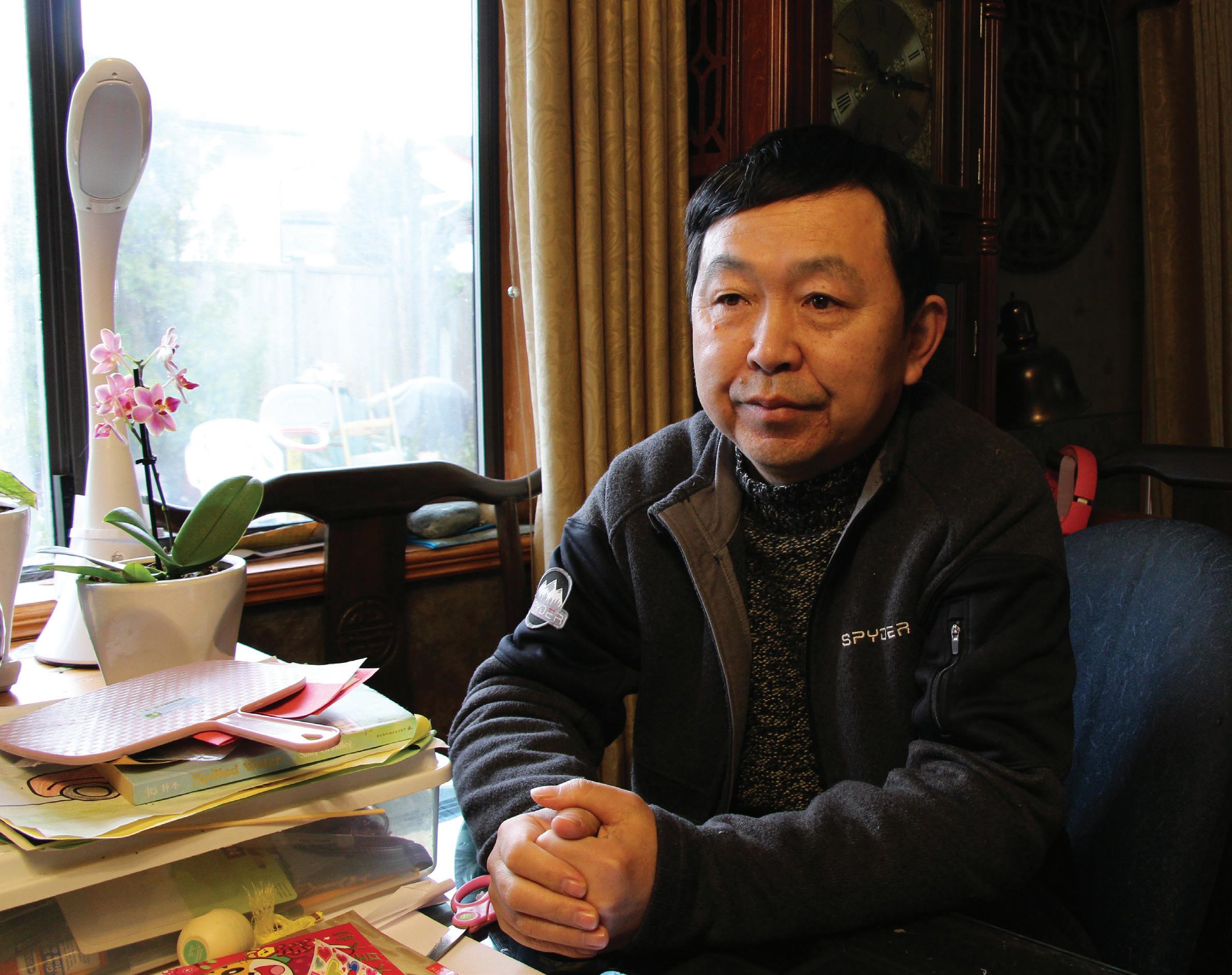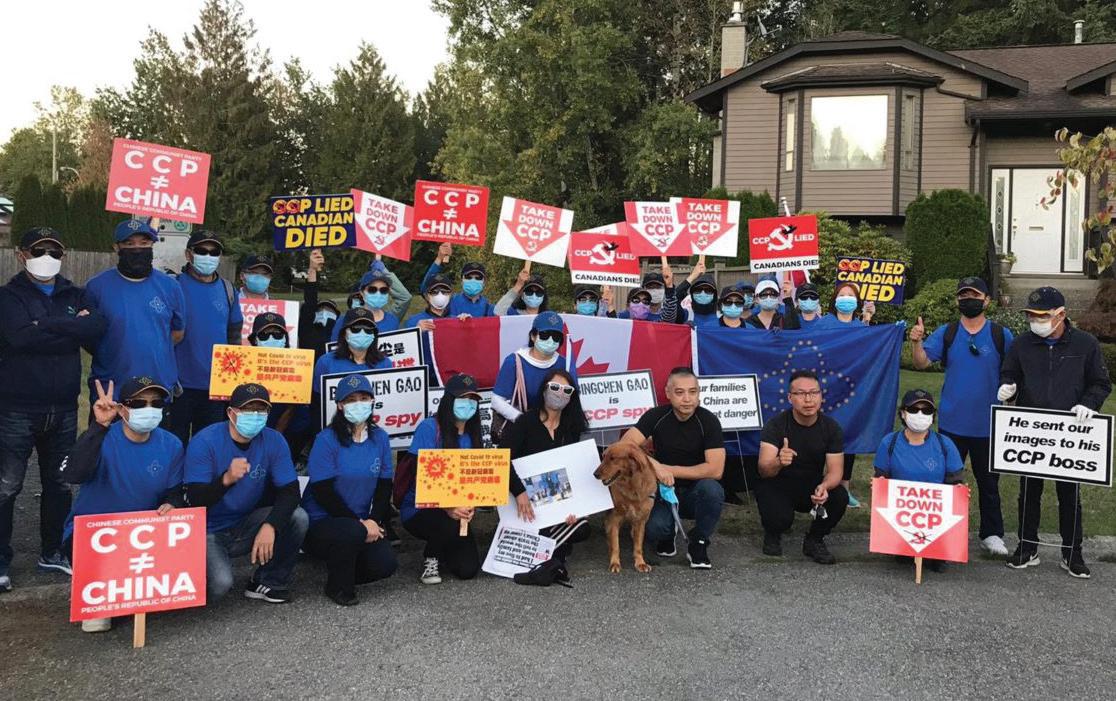
4 minute read
by Alex Antrobus
/// THE LEAD
War of Words
Advertisement
How a harassment campaign targeting Benson Gao Bingchen has raised broader questions about protections for journalists
story and portrait by ALEX ANTROBUS
For over 12 weeks in the fall of 2020, a nondescript culde-sac in suburban Surrey became very different when journalist Benson Gao Bingchen became the target of a directed harassment campaign.
Gao’s home is located in a typical quiet neighbourhood—but for a period of time it turned into anything but. Dozens of people were leading chants, filming Gao’s home and accusing the journalist of being a spy and agent for the Chinese Communist Party.
Gao is a long-time member of the news media, having been a working reporter for over 30 years. Starting in the late 1980s, Gao reported on Chinese financial and economic news in Beijing; he then immigrated to Canada, where he wrote for the Global Chinese Press, which publishes news across B.C. and Alberta for Chinese-language speaking Canadians.
Gao says that his harassers are followers of Guo Wengui, an exiled Chinese real estate magnet who has positioned himself as fighting the Communist regime. According to reporting by
Journalist Benson Gao Bingchen inside his Surrey home; (opposite) protesters gather outside Gao’s home in September 2020
Joanna Chiu from the Toronto Star, there have been a number of videos circulating on Chinese social media that depict a man who reportedly resembles and sounds like Guo listing off names of supposed traitors and spies for the Chinese state.
Guo, according to network analysis company Graphika, is at the heart of a wide-ranging disinformation network.
Speaking through his interpreter and friend Jimmy Yan, Gao expresses frustration with the protesters.
“If [I] was kind of a politically elected public icon, an official, that may be a different case. However, police treat the protest as if it is independent, like a local issue,” says Gao through his translator. “A group of people want to voice their anger against the CCP, but if that’s the case, if [I] was a CCP agent, the protesters should actually report [me] to a Canadian intelligence service.”
What happened to Gao is just one example of targeted harassment efforts toward journalists—something that the Canadian Association of Journalists (CAJ) is urging the Canadian government and law enforcement officials to address. Exact statistics on journalist harassment are hard to find, acknowledges Brent Jolly, national director of the CAJ, as there is currently no centralized method of tracking threats.
Just two years prior to Gao’s incident, in June 2018, Surrey talk show host Ashiana Khan was shot at in her car after speaking out against local gang violence. This incident only amplified the danger of being an outspoken media figure in B.C.
For Gao, the ongoing harassment he endured came to a climax on Nov. 25, 2020, when the protesters launched an unprovoked attack on Gao’s friend Louis Huang. The assault was caught on Gao’s security camera, and shows two protesters dragging Huang to the ground and repeatedly kicking him in the body and head, just outside Gao’s residence.
Further frustrating for Gao is the overall lack of police response from Surrey RCMP. He compares his experience with that of Premier John Horgan, who was targeted by environmental protest organization Extinction Rebellion outside his home in February 2020. In that case, the protesters were swiftly forced away by police, with three members of the group being arrested for mischief.
“This protest lasted for 77 days. So this is extraordinary,” says Gao. “And compared to what happened in front of Premier Horgan’s home, where protesters got arrested right away and detained. But the police in Surrey—the RCMP—they allowed such harassment to continue in a cul-de-sac where residents didn’t have any opportunity, didn’t have any avenues. So [myself] and Mr. Huang are very disappointed.”
In response to Gao’s critcism over how his experience with harassment was handled, the Surrey RCMP told the Langara Journalism Review they were not able to provide any comment as assault charges were laid in this investigation and the file is now going before the courts.
“We do however sympathize with the complainant and the area residents who were affected by the protestors,” wrote the Surrey RCMP in an unsigned email statement. “If someone feels that they were treated unfairly, they can make a complaint through the Surrey RCMP website and it will be investigated.”
Jolly is very aware of the dangerous environment that exists for journalists and public figures in the media spotlight. And he says that there are efforts underway by the CAJ to address the growing issue of harassment.
“I do think that there is an acknowledgement by those in leadership (of media organizations) that they have a role to play in protecting their employees from the deluge of hateful messages or harassing content,” Jolly says.
For all the recent progress, much more can and should be done to protect journalists just doing their job, he says: “There’s still a long way to go.”
-Benson Gao, journalist








